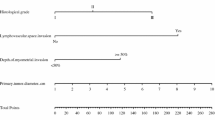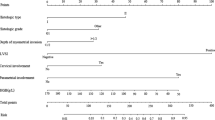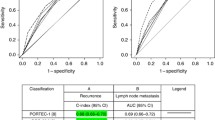Abstract
Background
This study was designed to develop a risk scoring system (RSS) for predicting lymph node (LN) metastases in patients with early-stage endometrial cancer (EC).
Methods
Data of 457 patients with early-stage EC who received primary surgical treatment between January 2001 and December 2012 were abstracted from a prospective, multicentre database (training set). A risk model based on factors impacting LN metastases was developed. To assess the discrimination of the RSS, both internal by the bootstrap approach and external validation (validation set) were adopted.
Results
Overall the LN metastasis rate was 11.8 % (54/457). LN metastases were associated with five variables: age ≥60 years, histological grade 3 and/or type 2, primary tumor diameter ≥1.5 cm, depth of myometrial invasion ≥50 %, and the positive lymphovascular space involvement status. These variables were included in the RSS and assigned scores ranging from 0 to 9. The discrimination of the RSS was 0.81 [95 % confidence interval (CI) 0.78–0.84] in the training set. The area under the curve of the receiver-operating characteristics for predicting LN metastases after internal and external validation was 0.80 (95 % CI 0.77–0.83) and 0.85 (95 % CI 0.81–0.89), respectively. A total score of 6 points corresponded to the optimal threshold of the RSS with a rate of LN metastases of 7.5 % (29/385) and 34.7 % (25/72) for low-risk (≤6 points) and high-risk patients (>6 points), respectively. At this threshold, the diagnostic accuracy was 83 %.
Conclusions
This RSS could be useful in clinical practice to determine which patients with early-stage EC should benefit from secondary surgical staging including complete lymphadenectomy.


Similar content being viewed by others
References
Siegel R, Naishadham D, Jemal A. Cancer statistics, 2013. CA Cancer J Clin. 2013;63:11–30.
Creasman WT, Odicino F, Maisonneuve P, et al. (2006) Carcinoma of the corpus uteri FIGO 26th Annual Report on the Results of Treatment in Gynecological Cancer. Int J Gynaecol Obstet. 95(1):S105–43.
Benedetti Panici P, Basile S, Maneschi F, et al. (2008) Systematic pelvic lymphadenectomy vs. no lymphadenectomy in early-stage endometrial carcinoma: randomized clinical trial. J Natl Cancer Inst. 100:1707–16.
Kitchener H, Swart AMC, Qian Q, Amos C, Parmar MKB. Efficacy of systematic pelvic lymphadenectomy in endometrial cancer (MRC ASTEC trial): a randomised study. Lancet. 2009;373:125–36.
Todo Y, Kato H, Kaneuchi M, Watari H, Takeda M, Sakuragi N. Survival effect of para-aortic lymphadenectomy in endometrial cancer (SEPAL study): a retrospective cohort analysis. Lancet. 2010;375:1165–72.
Ballester M, Dubernard G, Lécuru F, et al. Detection rate and diagnostic accuracy of sentinel-node biopsy in early stage endometrial cancer: a prospective multicentre study (SENTI-ENDO). Lancet Oncol. 2011;12:469–76.
Colombo N, Preti E, Landoni F, et al. Endometrial cancer: ESMO Clinical Practice Guidelines for diagnosis, treatment and follow-up. Ann Oncol. (2013) 24:33–8.
Uccella S, Podratz KC, Aletti GD, Mariani A. Re: Systematic pelvic lymphadenectomy vs no lymphadenectomy in early-stage endometrial carcinoma: randomized clinical trial. J Natl Cancer Inst. 2009;101:897–8; author reply 898–9.
Kitchener HC. To stage or not to stage? That is the question: (with apologies to Shakespeare). Int J Gynecol Cancer. 2010;20:S55–6.
Greer BE, Koh W-J, Abu-Rustum N, et al. Uterine Neoplasms. Clinical Practice Guidelines in Oncology. J Natl Compr Cancer Netw. 2009;7:498–531.
American College of Obstetricians and Gynecologists. ACOG practice bulletin, clinical management guidelines for obstetrician-gynecologists, number 65, August 2005: management of endometrial cancer. Obstet Gynecol. 2005;106:413–25.
Creutzberg CL, van Putten WL, Koper PC, et al. Surgery and postoperative radiotherapy versus surgery alone for patients with stage-1 endometrial carcinoma: multicentre randomised trial. PORTEC Study Group. Post operative radiation therapy in endometrial carcinoma. Lancet. 2000;355:1404–11.
Nugent EK, Bishop EA, Mathews CA, et al. Do uterine risk factors or lymph node metastasis more significantly affect recurrence in patients with endometrioid adenocarcinoma? Gynecol Oncol. 2012;125:94–8.
Keys HM, Roberts JA, Brunetto VL, et al. A phase III trial of surgery with or without adjunctive external pelvic radiation therapy in intermediate risk endometrial adenocarcinoma: a Gynecologic Oncology Group study. Gynecol Oncol. 2004;92:744–51.
AlHilli MM, Podratz KC, Dowdy SC, et al. Preoperative biopsy and intraoperative tumor diameter predict lymph node dissemination in endometrial cancer. Gynecol Oncol. 2013;128:294–9.
Ballester M, Dubernard G, Bats A-S, et al. Comparison of diagnostic accuracy of frozen section with imprint cytology for intraoperative examination of sentinel lymph node in early-stage endometrial cancer: results of Senti-Endo study. Ann Surg Oncol. 2012;19:3515–21.
Frumovitz M, Slomovitz BM, Singh DK, et al. Frozen section analyses as predictors of lymphatic spread in patients with early-stage uterine cancer. J Am Coll Surg. 2004;199:388–93.
Frumovitz M, Singh DK, Meyer L, et al. Predictors of final histology in patients with endometrial cancer. Gynecol Oncol. 2004;95:463–8.
Pecorelli S. Revised FIGO staging for carcinoma of the vulva, cervix, and endometrium. Int J Gynaecol Obstet. 2009;105:103–4.
Querleu D, Planchamp F, Narducci F, et al. Clinical practice guidelines for the management of patients with endometrial cancer in France: recommendations of the Institut National du Cancer and the Société Française d’Oncologie Gynécologique. Int J Gynecol Cancer. 2011;21:945–50.
Delpech Y, Cortez A, Coutant C, et al. The sentinel node concept in endometrial cancer: histopathologic validation by serial section and immunohistochemistry. Ann Oncol. 2007;18:1799–803.
Moses T, Holland PW. A comparison of statistical selection strategies for univariate and bivariate log-linear models. Br J Math Stat Psychol. 2010;63:557–74.
Steyerberg EW, Eijkemans MJ, Harrell FE Jr, Habbema JD. Prognostic modeling with logistic regression analysis: in search of a sensible strategy in small data sets. Med Decis Mak. 2001;21:45–56.
Harrell FE Jr, Lee KL, Mark DB. Multivariable prognostic models: issues in developing models, evaluating assumptions and adequacy, and measuring and reducing errors. Stat Med. 1996;15:361–87.
Harrell FE Jr, Lee KL, Pollock BG. Regression models in clinical studies: determining relationships between predictors and response. J Natl Cancer Inst. 1988;80:1198–202.
Schisterman EF, Perkins NJ, Liu A, Bondell H. Optimal cut-point and its corresponding Youden Index to discriminate individuals using pooled blood samples. Epidemiol Camb Mass. 2005;16:73–81.
Miller ME, Hui SL, Tierney WM. Validation techniques for logistic regression models. Stat Med. 1991;10:1213–26.
Creasman WT, Mutch DE, Herzog TJ. ASTEC lymphadenectomy and radiation therapy studies: are conclusions valid? Gynecol Oncol. 2010;116:293–4.
Creasman WT, Morrow CP, Bundy BN, Homesley HD, Graham JE, Heller PB. Surgical pathologic spread patterns of endometrial cancer. A Gynecologic Oncology Group Study. Cancer. 1987;60:2035–41.
Chi DS, Barakat RR, Palayekar MJ, et al. The incidence of pelvic lymph node metastasis by FIGO staging for patients with adequately surgically staged endometrial adenocarcinoma of endometrioid histology. Int J Gynecol Cancer. 2008;18:269–73.
Briët JM, Hollema H, Reesink N, et al. Lymphvascular space involvement: an independent prognostic factor in endometrial cancer. Gynecol Oncol. 2005;96:799–804.
Ballester M, Canlorbe G, Cortez A, et al. Histological and immunohistochemical profiles predict lymph node status in women with low-intermediate risk endometrial cancer. Gynecol Oncol. 2013;130:457–62.
Greer BE, Koh W-J, Abu-Rustum N, et al. Uterine Neoplasms. Clinical Practice Guidelines in Oncology. J Natl Compr Cancer Netw. 2009;7:498–531.
Bendifallah S, Genin AS, Naoura I, et al. A nomogram for predicting lymph node metastasis of presumed stage I and II endometrial cancer. Am J Obstet Gynecol. 2012;207:197.e1–8.
AlHilli MM, Podratz KC, Dowdy SC, et al. Risk-scoring system for the individualized prediction of lymphatic dissemination in patients with endometrioid endometrial cancer. Gynecol Oncol 2013;131:103–8.
Kamura T, Yahata H, Shigematsu T, et al. Predicting pelvic lymph node metastasis in endometrial carcinoma. Gynecol Oncol. 1999;72:387–91.
Luomaranta A, Leminen A, Loukovaara M. Prediction of lymph node and distant metastasis in patients with endometrial carcinoma: a new model based on demographics, biochemical factors, and tumor histology. Gynecol Oncol. 2013;129:28–32.
Koskas M, Genin AS, Graesslin O, et al. Evaluation of a method of predicting lymph node metastasis in endometrial cancer based on five pre-operative characteristics. Eur J Obstet Gynecol Reprod Biol. 2014;172:115–9.
Kitajima K, Suzuki K, Senda M, et al. Preoperative nodal staging of uterine cancer: is contrast-enhanced PET/CT more accurate than non-enhanced PET/CT or enhanced CT alone? Ann Nucl Med. 2011;25:511–9.
Abu-Rustum NR, Khoury-Collado F, Pandit-Taskar N, et al. Sentinel lymph node mapping for grade 1 endometrial cancer: is it the answer to the surgical staging dilemma? Gynecol Oncol. 2009;113:163–9.
Yabushita H, Shimazu M, Yamada H, et al. Occult lymph node metastases detected by cytokeratin immunohistochemistry predict recurrence in node-negative endometrial cancer. Gynecol Oncol. 2001;80:139–44.
Koh WJ, Greer BE, Abu-Rustum NR et al. National Comprehensive Cancer Network. Cervical cancer. J Natl Compr Canc Netw. 2013;11(3):320–43.
Acknowledgment
We thank Professeur Pierre-Yves Boelle who spent time reading and making comments on the manuscript.
Conflict of interest
None.
Author information
Authors and Affiliations
Corresponding author
Rights and permissions
About this article
Cite this article
Bendifallah, S., Canlorbe, G., Arsène, E. et al. French Multicenter Study Evaluating the Risk of Lymph Node Metastases in Early-Stage Endometrial Cancer: Contribution of a Risk Scoring System. Ann Surg Oncol 22, 2722–2728 (2015). https://doi.org/10.1245/s10434-014-4311-4
Received:
Published:
Issue Date:
DOI: https://doi.org/10.1245/s10434-014-4311-4




